Hogweed deals struck across North East to stop invasive menace


MSP Alexander Burnett asked Scottish Ministers whether any compulsory control orders are in place regarding the rural menace, alongside other threats like common Rhododendron, North American signal crayfish, and Didemnum vexillium or “carpet sea squirt”.
Although the likes of SEPA, Forestry Scotland and Marine Scotland have entered voluntary agreements with landowners across Scotland to curb invasive species, no compulsory instrument has been used.
Advertisement
Hide AdAdvertisement
Hide AdIn response to Mr Burnett, whose Aberdeenshire West constituency contains sensitive and biodiverse areas like the Cairngorms and Rivers Dee and Don, minister Lorna Slater said “hundreds” of local landowners had worked with the Scottish Invasive Species Initiative.
Scottish Conservative Mr Burnett’s questions were prompted by concerns about hogweed spread along the Don catchment.
The River Ury, the Don’s main tributary, has been of particular concern with local volunteers destroying plants at the likes of Riverside Park.
Mr Burnett said: “Giant Hogweed is very dangerous to people and animals, and it spreads aggressively.
“I am concerned for local children who may come across the plant along river walks, not knowing the serious health effects it poses. It is encouraging to hear landowners are working to control the encroachment of invasive species.
“Co-operation to contain the likes of hogweed is far easier than enforcement, so it’s good there have been no sanctions to date.
“But I’d like to see further co-operation between the Scottish Government, councils and rural communities about the types of help and potential funding available when they come across the problem.”
Green MSP Ms Slater said: “Working with landowners on a voluntary basis is a more effective way to secure a long-term commitment to tackling invasive plants.
Advertisement
Hide AdAdvertisement
Hide Ad“The Scottish Invasive Species Initiative works with hundreds of landowners to control invasive plants on riverbanks in northeast Scotland. As infestations are brought under control, landowners are asked to sign voluntary agreements to continue the control work.”